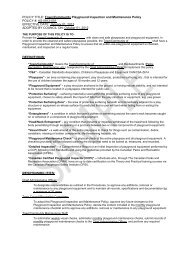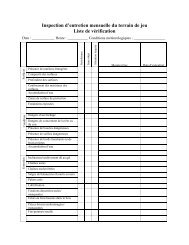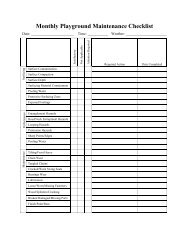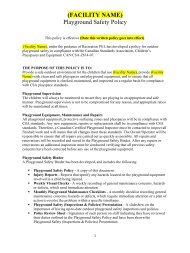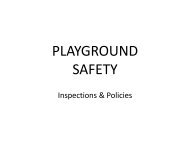Program Manual - Recreation PEI
Program Manual - Recreation PEI
Program Manual - Recreation PEI
- No tags were found...
Create successful ePaper yourself
Turn your PDF publications into a flip-book with our unique Google optimized e-Paper software.
Museums, Heritage Sites & Historical FiguresDuring your Island Experience you will travel through places that are home to some of <strong>PEI</strong>’sNational Historic sites, as well as museums that preserve the Island’s history. Following is a briefdescription of some of the stops in an Island Experience. The information gathered is courtesy of thegovernment webpage: www.gov.pe.ca under the category of Heritage and Culture. Other sources usedare referenced at the end of this section.Checkpoint #1Orwell CornerOrwell Corner Historic Village opened in July of 1973. Orwell was named in 1769 bySurveyor General Captain Samuel Holland in honor of Lord Francis Orwell, British Minister ofPlantations. Much of the early settlement took place at Orwell Cove and as fields were cleared androads improved settlement moved inland. The small crossroads community was founded in the earlynineteenth century by Scots that arrived on the Island with the Glenaladale Settlers brought out byCaptain John MacDonald, as well as families that came from the Isle of Skye, County Monaghan inIreland and United Empire Loyalists. Many of the current residents in the Orwell community aredescendants of these early pioneers. In 1970 the Provincial Centennial Commission, variousdepartments of the Provincial and Federal governments and dedicated volunteers in the community setplans into action and the site was restored to the late nineteenth century. The buildings were furnishedwith artifacts from the Provincial Collection and it opened to the public in July of 1973.Currently it is owned by the Province of Prince Edward Island and administered by thePrince Edward Island Museum and Heritage Foundation and the Orwell Corner Pioneer VillageCorporation with support from various departments of government as well as generated revenues.Sir Andrew MacPhailPhysician, editor, man of letters, and professor at McGill University, Sir Andrew was abrilliant scholar of wide interests. These included agriculture, so vital to his native Prince EdwardIsland, and social commentary, steeped in his Celtic heritage.Born in Orwell, Andrew Macphail was educated in Uigg School, entered Prince of WalesCollege at age fifteen; received his medical education at McGill in Montreal and editor of the McGillUniversity magazine, where he graduated B.A. in 1888, and M.D., C.M. in 1891, later becoming theirfirst professor of the history of medicine. Sir Andrew was founder and first editor of the CanadianMedical Association Journal. Beginning in 1905 he published more than 10 books. At the age of 50 heenlisted, spending twenty months at the Front with a field ambulance corps in World War One. Heconsidered his greatest honour being knighted by the King on New Year's Day, January 1, 1918; thiswas in recognition of both his military and literary contribution. He made Orwell both his family'ssummer sanctuary and a place to experiment in agriculture. His semi-autobiographical book TheMaster's Wife provides lasting insight into 19th century Island life. It was written in the 1920's, andfirst published in 1939. It is an excellent description of 19th century life on P.E.I., a very importantsocial history of P.E.I.'s past. The "Master" was his father, William, the book about his family and thecommunity they lived in, Orwell. Sir Andrew was a noted social critic, his writings reflecting his



